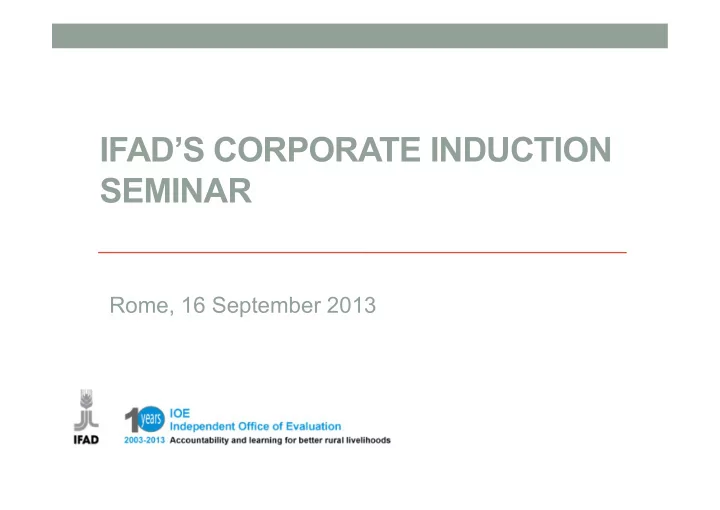

IFAD’S CORPORATE INDUCTION SEMINAR Rome, 16 September 2013
2 Background • The first Evaluation Policy was approved by the Executive Board in 2003 and established the independent Office of Evaluation. • The revised Policy (2011) was prepared following the recommendations of the Evaluation Cooperation Group (ECG) Peer Review and was approved by the Executive Board in May 2011.
3 Revised Evaluation Policy: structure maintained Evaluation Policy Purpose and Role Implementation & The Role of of Evaluation Procedures the EC Independence Accountability Evaluation Principles & Operational Policies Partnership Learning
4 Purpose of Independent Evaluation • Promote accountability and learning through independent evaluation of IFAD-financed policies, strategies and operations. • Evaluation standard follows international good practices. • Contribute to enhancing IFAD’s self-evaluation capacities.
5 Evaluation principles and operational policies • Independence of IOE, its work programme, budget, staffing, etc. • Accountability of performance and results • Partnership for a transparent and informed process • Learning to ensure the usefulness of evaluation findings and recommendations
6 Implementation procedures and arrangements • Annual work programming and budgeting (formulation process and approval process). • Devising the evaluation approach (Approach Paper, CLP). • Evaluation analysis and report (direct issuance of final report by IOE Director). • Reporting, communication, disclosure and dissemination. • Human resource management (selecting, appointing, dismissing and annual performance review of Director IOE, IOE staff and consultants).
7 Role of the Evaluation Committee • Assist the Board in exercising oversight over IFAD evaluation function (independent and self evaluation). • Ensure the full implementation of and compliance with IFAD Evaluation Policy • This entails: • Contribute to IFAD’s learning loop • Review IOE’s work programme and budget • Review IOE’s and IFAD Management major evaluation work • Assist the EB in the selection, appointment and termination of the IOE Director • New TORs approved in 2011 (including Country Visits)
8 The IOE Evaluation Manual The IOE Evaluation Manual was developed in 2009 and finalised after discussion with the Evaluation Committee It contains: • A description of the processes and methodology for project evaluations (PEs) and country programme evaluations (CPEs) • Evaluation fundamentals for PEs and CPEs as well as other types of evaluations
9 Key Methodological Fundamentals • Use of internationally recognised evaluation criteria, including innovation and gender • Application of a six-points rating system, with emphasis on the why analysis • Use of triangulations and mixed-methods to formulate evaluative judgements
10 Project Evaluations (PCRVs & PPAs) The main objectives are to: • Assess the performance and impact of the operation; and • Generate findings and recommendations that can be used for the design and implementation of similar future projects in the country
11 Country Programme Evaluations The main objectives of CPEs are to: • Assess the performance and impact of lending and non- lending activities in the country; and • Generate building blocks towards the development of the new results-based Country Strategic Opportunity Programmes (COSOPs).
12 The Annual Report on Results and Impact The ARRI has two main objectives: • Present a consolidated synthesis of the results and impact of IFAD-financed operations; and • Highlight key learning issues and development challenges that IFAD needs to address to enhance its overall development effectiveness.
13 Key Information on the ARRI • ARRI enshrined in the IFAD Evaluation Policy • First edition in 2003 • The ARRI is discussed with the IFAD Evaluation Committee and Executive Board in December
14 Corporate-Level Evaluations (CLEs) Assess the results of IFAD-wide corporate policies, strategies, business processes and organisational aspects Some recent CLEs: IFAD Replenishment Process and grants policy (2013) Direct Supervision and Implementation Support (2012) IFAD Efficiency (2011/2012) IFAD’s Private-Sector Development and Partnership Strategy (2011) IFAD’s Performance with regard to Gender Equality and Women’s Empowerment (2010)
15 Evaluation Synthesis The most recently introduced evaluation product, to be produced every year on selected topics The purpose is to: Identify and capture accumulated knowledge on common themes Facilitate the use of evaluation findings Upcoming reports: Youth; Water management and conservation Recent synthesis: Gender; Role of Cooperatives in Rural Development; Targeting; COSOP as an instrument
16 Budget • In 2013 – administrative budget of US$ 6 million, this reflects a 1.4 per cent decrease in real terms compared to 2012 budget. Reduction of one staff position in the division compared to 2012
Recommend
More recommend